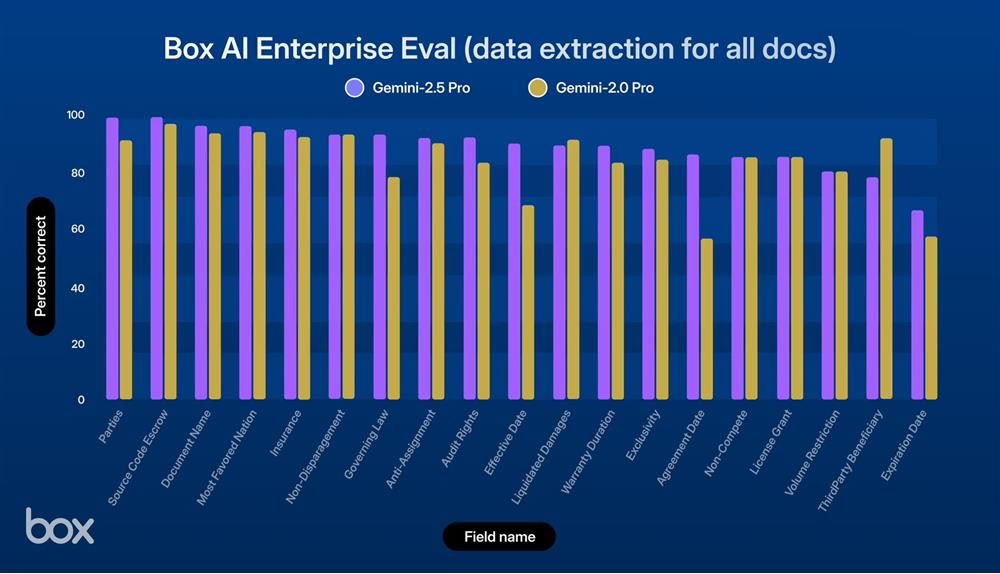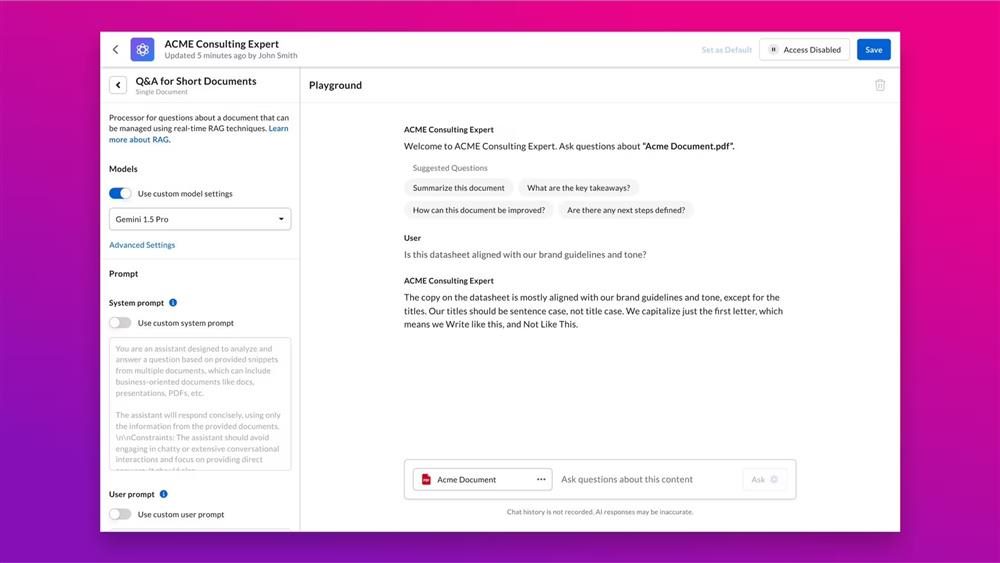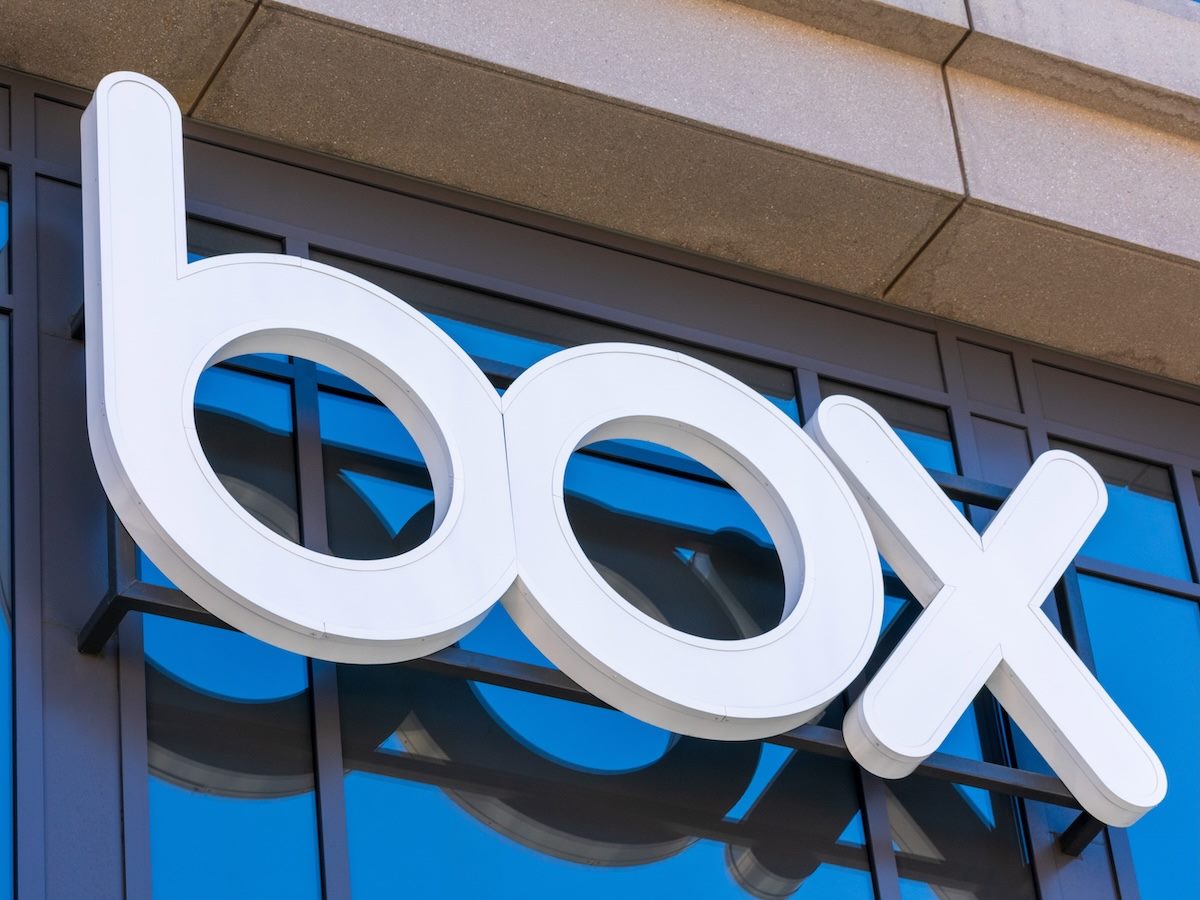One look at Box CEO Aaron Levie's LinkedIn posts and you'll get a sense of the company's vision for the AI-first enterprise.
Within hours of an update from one of the major large language model providers, Levie announces Box's integration with the new LLM or one in the works. This week alone, Box (through Levie) announced support for Google's Agent2Agent protocol and a forthcoming integration of Meta's Llama 4 open weight family.
All of this builds on Box's aim to build "the leading AI Platform for Content, and ... to bring the power of every leading model to Box."
Below we'll catch up on some of Box's latest updates, including Google’s newest AI model Gemini 2.5 Pro, which Box added to Box AI Studio at the beginning of April, to see what they say about the future strategy of the intelligent content management provider.
Box Keeps Bringing In New LLMs
The rate of releases in the LLM space have reached a breakneck pace, and Box appears determined to keep up with all of them.
Box AI and Gemini 2.5 Pro
Released in March 2025, Gemini 2.5 Pro Experimental builds on February's release of Gemini 2.0. Gemini 2.5 adds to the improvements in reasoning abilities and support for multiple types of input, like text, images and code introduced by 2.0, with a greater focus on coding performance geared specifically towards web app creation and agentic code applications.

These improvements make it a useful tool for developers and businesses that need to solve complex problems or work with large amounts of data.
Box AI and GPT-4.5
At the end of February, OpenAI released GPT-4.5, and Box quickly made it available in Box AI. GPT-4.5 brings improvements in coding, math and reasoning, making it better suited for handling complex tasks in business settings.
Early testing at Box found GPT-4.5 performed better than the earlier GPT-4o model across multiple areas. Overall, Box stated, it was about 4% more accurate when answering questions based on enterprise documents and handled mathematical reasoning well, as it was able to calculate financial figures even when the data wasn't explicitly stated in the text.
The model showed improvements in organizing facts, grouping related information and answering questions that required filtering and analysis. Where earlier models had difficulty with complex math and calculations, GPT-4.5 showed noticeable progress.
In practical terms, this means tasks like reviewing research papers or analyzing long contracts can be done more quickly. When applied within Box AI Studio, GPT-4.5 could summarize detailed documents, pull out key data points, spot patterns and compare different methods efficiently. For researchers, this could speed up the process of developing new ideas.
Where LLM Integration Fits in Box's AI Agent Plans
GPT-4.5 and Gemini 2.5 Pro fit into Box's broader strategy of supporting AI agents. In a recent blog post, Vishal Naik, head of product marketing and platform at Box, outlined how the company plans to fix a common challenge in building AI agents.
AI agents need secure access to both public data sources and organization's proprietary information to function well. Box is working to integrate all the tools it considers necessary to address this challenge directly into Box AI Studio, its AI agent workshop launched earlier this year.

Leveraging the combined capabilities of OpenAI’s advanced tools, including web and file search, alongside Box AI’s enterprise-grade content intelligence, organizations will be able to build sophisticated agents that dynamically integrate private enterprise data with external information sources, Naik wrote. With provided reference code, teams can rapidly prototype and deploy Box AI agents on the OpenAI platform or embed Box AI as a modular component within larger, multi-agent systems to support complex, high-value workflows at scale.
Box Adds Enterprise Advanced Plan
Box also recently added new AI features focused on improving content management and automating workflows organizations through its new Enterprise Advanced Plan.
Unveiled earlier this year, the plan offers enterprises tools like Box AI Studio for building custom AI agents, multi-document querying to analyze up to 10 files at once, and image querying to extract information from visual content. These features are intended to make AI tools more accessible across organizations and help businesses automate tasks and get more value from their data.
So what does the regular flow of updates mean for the company?
How Box AI Supports Business Processes
The introduction of these new LLMs, along with existing models, make Box AI not only smarter but also more strategic, Ja-Naé Duane, an AI expert and research fellow at MIT’s Center for Information Systems Research, told Reworked.
Organizations can now transform unstructured content into a central intelligence hub, integrate with tools like CRMs and project management systems, and explore sophisticated customization through Box AI Studio, she said. One of Box AI's strengths is its support for multiple LLMs, as well as its ability to manage images and text together, automate cross-document workflows, all with enterprise-grade security and audit controls, she continued.
Duane noted how the system's ability to accurately interpret and calculate contractual timelines, even when date logic is embedded within multiple clauses, can save company's time and headaches. It can resolve conditions such as effective date plus 90 days or termination with a 30-day cure period within a full-document context.
"This reduces disputes, ensures adherence to deadlines, and dramatically decreases audit preparation time,” she said.
Duane described Box's integration of Gemini 2.5 as a major improvement. She explained that Gemini 2.5 Pro strengthens Box AI by adding advanced reasoning and the ability to understand the full context of a document.
For example, it can process 300-page contracts in a single pass and accurately interpret complex legal language, such as conditional obligations or time-based clauses (for example, "30 days after signature"). The result is reduced errors, faster processing and improved accuracy in critical areas like legal clause analysis, compliance requirements and financial workflows.
As it stands, Box AI automates end-to-end document workflows, extracting metadata, triggering reviews and auto-generating reports. However, Duane notes that AI isn't magic. Box AI can still misread tables, confuse similar characters or struggle with non-English and poor-quality scans. Auto-classification can only happen through custom agents, and human oversight is still required for legal-critical outputs, she added.
As a result, Duane recommends enterprises combine Box AI with governance tools and human validation.
Box Puts GenAI to Work. Businesses Must Recognize Limitations
Box is making a smart play by embedding generative AI into its platform, not just as a fancy extra or gimmick but as a core element of how businesses work with documents, content and data, Cheney Hamilton, CEO for Find Your Flex Group and research analyst at Bloor Research, told Reworked.
Unlike competitors who treat AI as an add-on, Box is making sure AI helps users summarize reports, extract key insights and generate content effortlessly, she continued. And because it doesn’t lock itself into a single AI model, it gives users more flexibility in how they use AI across tasks, she said.
The challenge with this is simple, she added. It is down to trust. Generative AI is not like traditional automation; it creates something new every time it is used, which means accuracy and human oversight are key. If people rely too much on AI to do their thinking for them, they risk missing critical details or errors that could impact decision-making.
It is therefore on businesses to balance AI adoption with strong training and real governance to ensure employees know how to use AI as a tool, not as a crutch, Hamilton said.
Done right, however, this shift could save teams hours wasted digging through reports or struggling to write up findings, she said.
"Box’s approach shows where enterprise AI is heading — it’s not about replacing people, it’s about helping them work smarter,” Hamilton concluded. "The businesses that figure out how to blend AI with human expertise will be the ones leading the future of work.”
Taming Enterprise Content Management Chaos
Digital clutter has long plagued enterprise content management. Scattered files, buried documents and wasted hours spent searching for information are the norm, Varyence co-founder Jason Hishmeh added.
Box AI, with its frequent addition of LLM models, is transforming this chaotic system by making it easier to extract insights, summarize complex documents and find answers hidden in massive datasets. As one description puts it: "It’s like a hyper-organized, tireless office assistant with instant access to everything," he said.
What sets Box AI apart for Hismeh is its focus on being enterprise-ready. It goes beyond the flashy capabilities of AI by ensuring that access controls are respected, data privacy is preserved and it fits seamlessly into existing workflows. This is not a one-size-fits-all solution — it is "purpose-built" for the needs of businesses.
He also sees Box AI changing team collaboration. With AI pulling insights in minutes, teams reach quick alignment quickly and make decisions with confidence. No more searching for answers or explaining files —"the knowledge is already present."
While generative AI has its limitations, it can be a powerful tool when used wisely. As Hishmeh notes, "AI should be a tool to promote clarity and confidence — not an alternative to critical thinking."
Editor's Note: Read more about how AI is disrupting the workplace:
- Content Management Gets Disrupted, Again — Keeping up with all the name changes ECM has gone through over the years is hard. But the latest – intelligent content services – might just have holding power.
- What's Next for Enterprise Search? AI Knows — People don't want to search, they want to find information. A new breed of solutions are changing the boundaries of enterprise search.
- Hyland Pivots From ECM Pioneer to AI-Driven Enterprise Automation — A dramatic rebrand at Hyland found the 30+ year old ECM leader switching gears to become an AI-powered automation powerhouse. What's behind the move?
